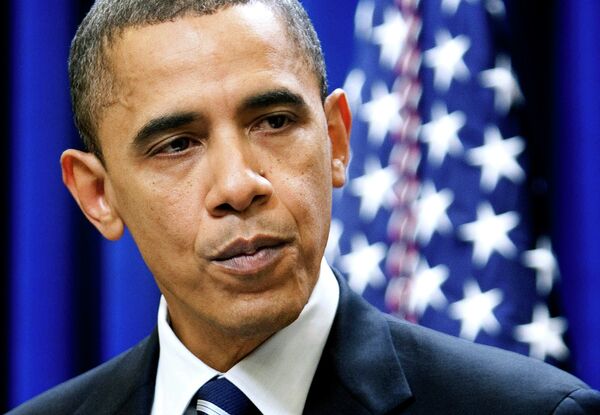MOSCOW, September 3 (RIA Novosti) — President Obama has been faced with heavy criticism from the US Congress for his "incomplete" and "unclear" plan to fight ISIS in the Middle East in the wake of the gruesome beheading of American journalist Steven Sotloff.
"We are scheduling a hearing upon our return and requesting the Secretary of State to present a plan, a strategy focused on rolling back ISIS, defeating ISIS through the use of airstrikes and the support of those with common interests," said Rep. Ed Royce (R-CA), the House Foreign Affairs Committee's chairman, as cited by the Daily Beast.
The beheading of a second American journalist, Steven Sotloff, has acted as a catalyst for the congressional decision to get more deeply involved in the war against ISIS in Iraq and Syria.
However, although US Secretary of State John Kerry claimed that "ISIL must be destroyed/will be crushed," in a statement he posted on Twitter on August 20, the White House has not yet developed a comprehensive strategy, experts note.
ISIL must be destroyed/will be crushed.
— John Kerry (@JohnKerry) August 20, 2014
"Foreign-policy experts and pundits in Washington are up in arms, ready to go to war – that is, send someone else to fight in the Middle East – and cannot believe that President Obama is resisting their call to defeat the Islamic State (ISIS) by expanding US airstrikes against ISIS targets from Iraq to Syria," Leon Hadar noted ironically in his article, "How Obama’s Non-Strategy ISIS Strategy Works", which was published by The American Conservative. Hadar is a libertarian former Cato Institute research fellow and a global affairs analyst at Wikistrat; he served as a foreign policy advisor to the 2008 Ron Paul presidential campaign.
Meanwhile, US top officials are urging the Obama administration to start providing weapons to the Free Syrian Army (FSA), which is fighting ISIS in northern and eastern Syria. Although the administration requested $500 million from Congress in order to empower the FSA earlier this year, it has inexplicably slowed down the process of approval, leaving lawmakers "frustrated with the White House's foot dragging," the Daily Beast notes. Rep. Ed Royce underscores that the US has not fully followed through with providing the Kurdish Peshmerga forces with military equipment, according to a media source.
Remarkably, the latest Pew Research poll has indicated that after the beheading of James Foley, 67 percent of Americans have become inclined to consider ISIS a major threat to the US, 21 percent has named ISIS a "minor threat," and only 5 percent think that the extremist group is not a menace to their country. It's worth mentioning that 71 percent are concerned about the danger posed by all "Islamic extremist groups like al Qaeda" (including ISIS), according to the survey.
While congress continues to insist that the arming of the FSA and continuous air strikes on terrorists in Iraq and Syria may solve the problem, experts warn that US military involvement in Middle Eastern affairs will lead to the further disintegration of the region.
"A wider American military intervention, including the deployment of ground troops, would only provide disincentives to the regional players to act responsibly and use their own resources as part of an ad hoc partnership to defeat ISIS," stresses Leon Hadar, adding that some of the ISIS militant groups or its members "in different incarnations" still receive support from Saudis and Turks. "As long as such regional actors think they can safely fuel the fire, they will," the analyst warns.

